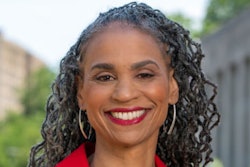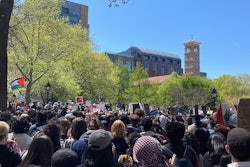Biden administration officials, institutional leaders, researchers, advocates, and students gathered in Washington D.C. Wednesday for the National Summit on Equal Opportunity in Higher Education to plot next steps after the Supreme Court’s decision against race-conscious admissions. Although the ruling was a blow to their interests, attendees vowed to fight for diversity in whatever ways that they could.
The summit was one of several responses that the Biden administration announced on the day of the ruling and the first one to come to fruition. The U.S. Department of Education also pledged to issue guidance to colleges and universities about what admissions practices remain legal, to release a report on admissions strategies for increasing diversity, to consider collecting and publishing more information on application and enrollment trends, and to help states analyze data that they already have. Secretary of Education Dr. Miguel A. Cardona speaks at the National Summit on Equal Opportunity in Higher Education
Secretary of Education Dr. Miguel A. Cardona speaks at the National Summit on Equal Opportunity in Higher Education
Multiple speakers at the summit critiqued the Supreme Court’s decision and reaffirmed their desire to achieve diversity by whatever legal means remain. Most prominent among them was Secretary of Education Dr. Miguel A. Cardona, who described the decision as “threaten[ing] to take us backwards,” and “a new low point” for higher education.
Cardona said that changes on several fronts will be necessary for colleges and universities to maintain the benefits of diversity, including increasing financial aid, expanding recruitment and relationships with K-12 schools, and fixing hitches in the transfer process. He also announced a new $45 million competition to elevate ways of helping minoritized students graduate but offered few other details.
Assistant Secretary for Civil Rights Catherine Lhamon said that individuals concerned with campus diversity should keep striving towards that goal.
“The court did not rule that working to achieve diversity is unlawful,” she said.
She emphasized that admissions offices can still consider an applicant’s background in relation to how it has affected their life experience, as described by Chief Justice John G. Roberts in his majority opinion. Lhamon pledged that the department’s guidance on permissible admissions practices would be available in August and advised that leaders ignore the statements of groups such as Students for Fair Admissions, the plaintiff in the race-conscious admissions cases, arguing that the ruling restricts race-conscious recruitment, financial aid, and data collection.




















